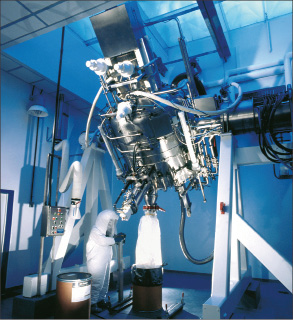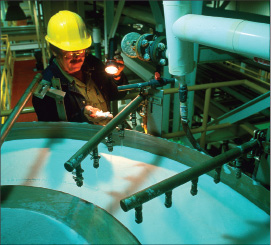![]()
ONLINE
![]()
ONLINE

AMPAC
Aims High
Editors’ Note
John Gibson joined American Pacific Corporation (AMPAC) in 1992 as Vice President-Engineering & Operations. He became Chief Executive Officer and President in 1997, before being elected Chairman of the Board in 1998. Formerly the Director of Modernization of USS-POSCO Industries – a position he held for more than five years – Gibson has also served as the Chief Executive Officer and President of AMPAC’s subsidiaries, including AMPAC In-Space Propulsion, since 2004; of AMPAC Farms, Inc. and of American Pacific Corporation (Nevada) since 1997; and American Azide Corporation since 1993.
Company Brief
Headquartered in Las Vegas, American Pacific Corporation (www.apfc.com) was founded in Henderson, Nevada, in 1955 for the purpose of manufacturing specialty chemicals. The business has since expanded into three units: aerospace equipment, fine chemicals, and specialty chemicals. The applications of these products are seen in certain antiviral, cancer treatment, and nervous system drugs, as well as commercial space and national defense programs. AMPAC employs more than 500 employees in three U.S. manufacturing facilities and a fourth in the United Kingdom.
Your father founded AMPAC 52 years ago. Can you share some of the company’s history and the legacy your father left?
My family came to Las Vegas in 1936. At the onset of World War II, there was a serious shortage of magnesium metal in the country. As a consequence, a large magnesium plant was built in Southern Nevada to take advantage of the relatively cheap hydroelectric power at the Hoover Dam. My father was the first engineer hired for that project. When the war ended, dad was successful in opening a chemical manufacturing company in Henderson, Nevada, at the site of the now closed magnesium plant. That company, Western Electro Chemical Company, became the first commercial producer of ammonium perchlorate, which is the principal oxidizer in solid fuel rockets. In 1955, my father, Fred Gibson Sr., and two partners founded Pacific Engineering Production Company of Nevada, PEPCON, known today as American Pacific Corporation. Dad’s contribution to the new company was the 600 acres of barren land that he and his two partners bought back in the ’40s. My other brother, Jim, became Vice President and Chief Engineer. Fred Gibson Jr., was Vice President of the company, and it was his patents for making ammonium perchlorate that became the technical foundation for AMPAC. In the early ’60s, Fred succeeded our father as President and CEO. The company went public in 1972 and is today traded on the Nasdaq. An accidental fire in 1988 caused the relocation of the manufacturing facilities to Cedar City, Utah. The move was a success, and in 1997, AMPAC bought the book of business from Kerr-McGee, the other ammonium perchlorate maker, to become the sole North American producer of this strategically used chemical.

API/pharma work at AMPAC Fine Chemicals
In 2004, AMPAC bought the liquid in-space propulsion business of GenCorp, and facilities in Niagara, New York, and Westcott in the United Kingdom were acquired. In November 2005, AMPAC completed the largest acquisition in its 50-year history, by buying the fine chemical subsidiary of GenCorp, Aerojet Fine Chemicals, out of Rancho Cordova, California.
Today the company has three primary segments: specialty chemicals at Wecco in Utah; active pharmaceutical ingredients at AMPAC Fine Chemicals in California; and satellite components and thrusters in New York and the United Kingdom. I joined the company in 1992 and succeeded Fred as CEO in 1997. He remains on the board of directors.
Can you explain the role AMPAC’s products play in lifesaving drugs, the space shuttle, fire extinguishing equipment, and other applications?
In many ways, the products are complimentary. Our company, AMPAC Fine Chemicals [AFC], near Sacramento, California, specializes in ingredients for antiviral and cancer treatment drugs, and formulations used to treat central nervous system disorders. In 2006, AFC was identified as a supplier for Roche of the key component in Tamiflu.
The oldest product made by AMPAC is ammonium perchlorate. It’s produced along with other specialty chemicals at Wecco, near Cedar City, Utah. Sodium and potassium, types of perchlorates, are used in our other business units.
Halotron, the clean fire-extinguishing agent that has replaced Halon, is also made by AMPAC. It’s currently used at over 60 airports. AMPAC also produces sodium azide, which is used in pharmaceuticals and is in the approval process for replacing methyl bromide as an agricultural pesticide. Lastly, AMPAC designs, fabricates, and tests small thrusters for satellites. This business, based in Niagara Falls, New York, has only one competitor in North America.

Oxidizer manufacturing for
solid propellants of the space shuttle
In what ways do you see AMPAC’s growth evolving in the coming years?
We believe that it’s the organic growth opportunity in fine chemicals and in-space propulsion that will fulfill that objective. As we reach capacity, we may elect to grow either through capital spending or by small strategic acquisitions. The specialty chemical business, although not growing at this time, is stable and provides healthy cash flow.
AMPAC is listed on the Nasdaq. What are the most compelling reasons for investors to buy AMPAC stock?
For a long time AMPAC was criticized for being exposed to a single point of failure, namely the space program, and more specifically the space shuttle. Diversity has changed that, and AMPAC now has a firm foundation in three primary business segments that are healthy and very promising. I’m very proud to say that in the past 10 years, AMPAC has nearly tripled its revenue.
What impact does AMPAC seek to have on the communities in which it does business?
AMPAC’s 500 employees are active in the communities they serve. We encourage their participation in both professional societies and community organizations. AMPAC positively and effectively serves five constituencies: its shareholders, its customers, its suppliers, its employees, and the community. Nevada, with its relatively low taxes and no corporate or individual income taxes, is an attractive location for business, and we’re proud to be a part of its community.